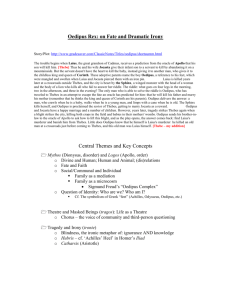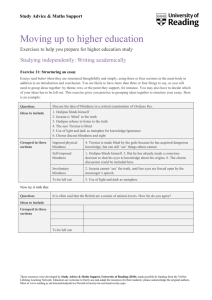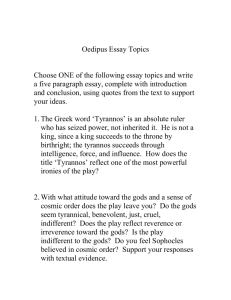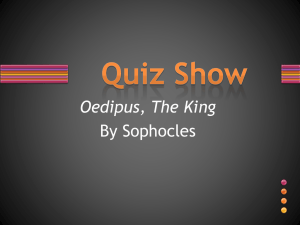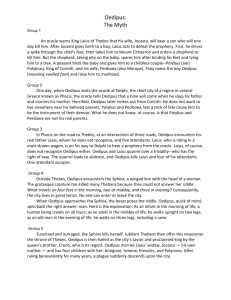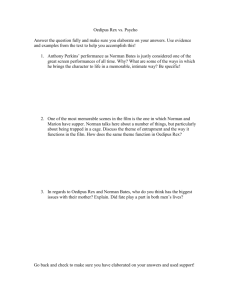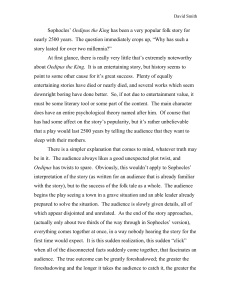OEDIPUS - Crestwood Local Schools
advertisement
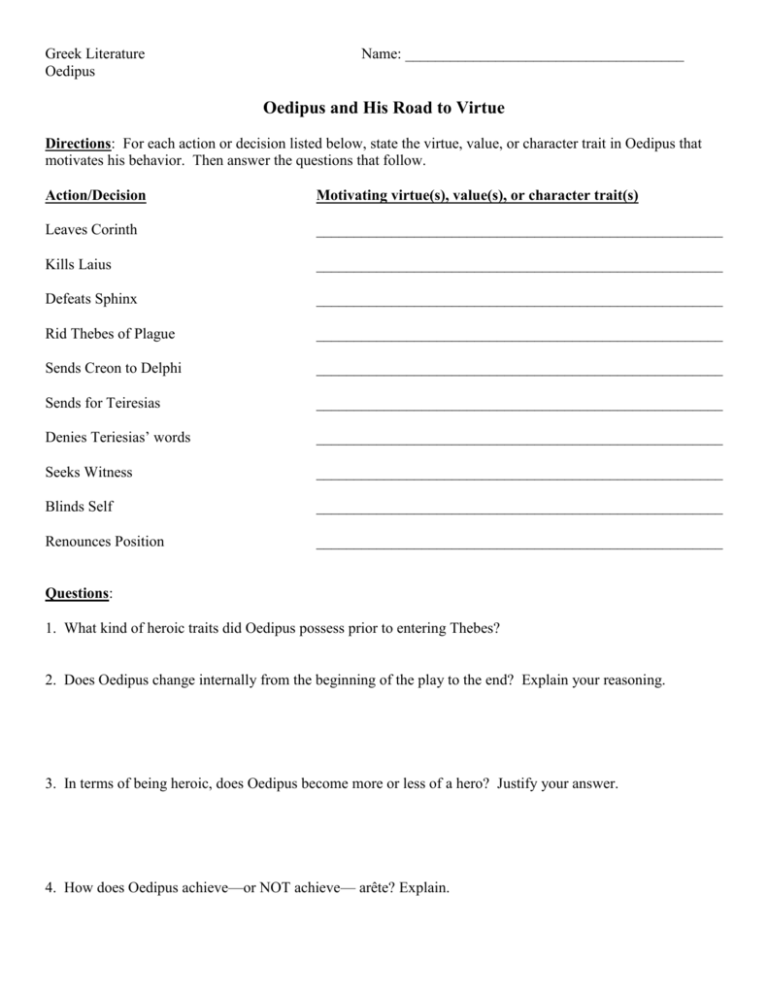
Greek Literature Oedipus Name: _____________________________________ Oedipus and His Road to Virtue Directions: For each action or decision listed below, state the virtue, value, or character trait in Oedipus that motivates his behavior. Then answer the questions that follow. Action/Decision Motivating virtue(s), value(s), or character trait(s) Leaves Corinth ______________________________________________________ Kills Laius ______________________________________________________ Defeats Sphinx ______________________________________________________ Rid Thebes of Plague ______________________________________________________ Sends Creon to Delphi ______________________________________________________ Sends for Teiresias ______________________________________________________ Denies Teriesias’ words ______________________________________________________ Seeks Witness ______________________________________________________ Blinds Self ______________________________________________________ Renounces Position ______________________________________________________ Questions: 1. What kind of heroic traits did Oedipus possess prior to entering Thebes? 2. Does Oedipus change internally from the beginning of the play to the end? Explain your reasoning. 3. In terms of being heroic, does Oedipus become more or less of a hero? Justify your answer. 4. How does Oedipus achieve—or NOT achieve— arête? Explain. HOW DEFINED IS HUMAN DESTINY? Oedipus Rex vividly presents the conflict of several strong-willed and prideful people who each acted according to a personal sense of duty, conscience, and a belief that they could control their own destiny. Reflect briefly upon the decisions and actions of Laius, Oedipus, and Jocasta. Each of them tried to escape a fate that had been predetermined for them, and each of them ultimately met their destruction. Although today’s society may hold differing opinions about fate or predestination, something might still be learned about the flaw each of these characters held to the point of their own demise: stubborn pride. The only note of hope is the humility and self-knowledge Oedipus gains at the end of the play and his ultimate self-sacrifice for his people. IMPLICATIONS (1.) In a great piece of literature, the thoughts and questions of the author and the problems of the characters continue to have deep meaning through the ages. Consider the following statements from the play. Has time made them “antiquated” or do they still have meaning for us today? Respond briefly below but be specific. “To throw away an honest friend is, as it were, to throw your life away…” (l. 611-13) “Time is the only test of honest men,” (l. 615) “What man on earth wins more of happiness than a seeming and after that turning away?” (l. 1190-92) [trans: “Joy is but for a moment—an illusion that quickly fades”] “troubles hurt the most when they prove self-inflicted” (l. 1231-32) “In season, all is good” (l. 1517) (often translated, “time eases all things”) “Do not seek to be master in everything, for the things you mastered did not follow you throughout your life.” (l. 1522-23) Response: _________________________________________________________________________________ __________________________________________________________________________________________ __________________________________________________________________________________________ (2.) In real life, it is often difficult to know people’s true motives for their actions. But in a work of literature the author can show us the minds and hearts of the characters. Which of the following motives or qualities could belong to Oedipus and which to Jocasta or Creon? List the names of characters beside the traits that best describe them. Courage Duty Pride Power Loyalty to family Religious belief Patriotism Anger Selfishness Stubbornness Logic Wisdom Is Oedipus all right or all wrong? Explain. Which motives are the better ones? Why? Do you agree or disagree with the following statements. Explain your answer on a separate sheet of paper. Sophocles presents Oedipus as a typical villain and gives him no “saving virtues.” In the end, Oedipus is more victim than either villain or hero. (3.) The conflict of wills in this play results from the internal conflict and motives of the characters. Using one of these pairs, demonstrate and support your knowledge and opinion regarding the conflict and motives of the characters. Write your thoughts on a separate sheet of paper. Oedipus & Teiresias Oedipus & Creon Jocasta & Oedipus


